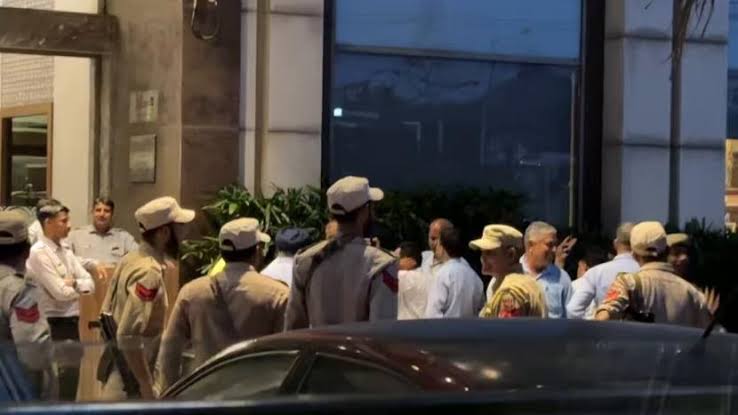Pakistani delegation arrives in Jammu to discuss Indus water treaty

A Pakistani delegation arrived in Jammu on Sunday evening in connection with the 1960 Indus Water Treaty (IWT). The treaty sets out a mechanism for cooperation and information exchange between the two countries regarding their use of the rivers, known as the Permanent Indus Commission which includes a commissioner from each of the two countries. It also sets out a process for resolving so-called “questions”, “differences” and “disputes” that may arise between the parties.
The Indus Waters Treaty was signed between then Prime Minister Jawaharlal Nehru and former Pakistan President Ayub Khan in 1960. The Permanent Indus Commission (PIC) is a bilateral commission of officials from India and Pakistan, created to implement and manage the goals of the Indus Waters Treaty of 1960, brokered by the World Bank. It comprises the Indus Commissioners from both sides and discusses technical matters related to the implementation of the treaty.
India and Pakistan have engaged in a long outstanding water dispute over two hydroelectric projects.
Pakistan has objected to the building of the Kishanganga (330 megawatts) and Ratle (850 megawatts) hydroelectric plants by India, saying that it violates the provisions of the treaty. India insists on its right to build these projects and holds that their design is fully in compliance with the guidelines of the treaty.
The World Bank had asked both countries to consider alternative ways to resolve their disagreements over the Indus Water Treaty Dispute in 1960. It was given a Shut Up Call by India, as it has no business in poking its nose in a bilateral treaty.
In 2015, Pakistan requested the appointment of a Neutral Expert to examine its technical objections to India’s Kishenganga and Ratle Hydro Electric Projects (HEPs). In 2016, Pakistan unilaterally retracted this request and proposed that a Court of Arbitration adjudicate its objections.
Pakistan, despite repeated efforts by India to find a mutually agreeable way forward, has refused to discuss the issue during the five meetings of the Permanent Indus Commission from 2017 to 2022.
The Pakistani delegation is set to visit different dam sites in the forthcoming days. Delegations from both India and Pakistan on June 24 flew to Jammu and Kashmir’s Kishtwar district with neutral experts and began inspection of two power projects under the Indus Water Treaty (IWT), officials said.
About 40 people reached Jammu on Sunday evening and flew to Kishtwar this morning for inspection of various under-construction power projects in the Chenab valley region, the officials said.
This is the first visit by a Pakistani delegation to Jammu and Kashmir in more than five years under the dispute settlement mechanism of the 1960 treaty.
A three-member Pakistan delegation inspected the Pakal Dul and Lower Kalnai hydroelectric power projects under the provisions of the IWT for the last time in January 2019, before the ties between the two countries froze.
Immediately after landing at an army camp, the delegation visited the National Hydroelectric Power Corporation (NHPC) headquarters, the officials said, adding, that they left for the 85 MW Ratle hydroelectric power project site at Drabshalla for dam inspection. They will also visit the 1,000 MW Pakal Dul hydroelectric project on river Marusudar, a tributary of river Chenab, and other power projects during their stay in Kishtwar, the officials said.
Pakistan had in a request to the World Bank in 2016 objected to the design features of the two hydroelectric power projects and sought a settlement through a ‘Neutral Expert.’ The country, however, later withdrew the request and sought adjudication through a Court of Arbitration. India, on the other hand, insisted that the issue should be resolved solely through ‘Neutral Expert’ proceedings.
After failed negotiations, the World Bank appointed a Neutral Expert and the chair of the Court of Arbitration in October 2022. Issuing a notice for the modification in the Treaty, India warned that “such parallel consideration of the same issues is not covered under any provision of the IWT.”
In July 2023, the Court of Arbitration ruled that it was “competent to consider and determine the disputes set forth by Pakistan’s request for arbitration”.
Pakistan filed its first Memorial, which listed out its legal case with documents, under this process in March this year. A month later, the court undertook a week-long visit to the Neelum-Jhelum Hydro-Electric Plant in Pakistan-Occupied Kashmir “to familiarise the court with general aspects of the design and operation of run-of-river hydro-electric plants along the Indus system of rivers.” While India refused to take part in the Court of Arbitration, it submitted a Memorial to the Neutral Expert in August 2023.
Pakistan joined the second meeting of the parties held by Neutral Expert in Vienna in September last year which discussed matters related to the organisation of the site visit. The Jammu and Kashmir administration has appointed 25 “liaison officers” to coordinate the visit of neutral experts along with delegations from India and Pakistan.




